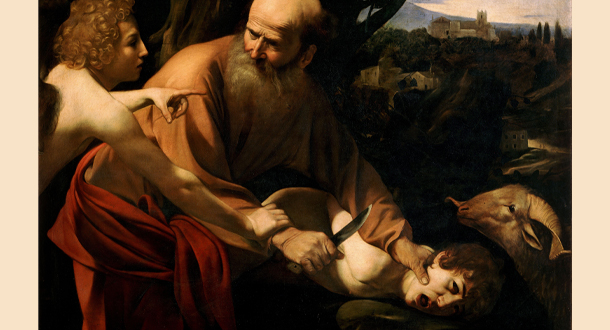
Scripture:
Reflection:
The first reading for today’s Mass is one of the Bible’s most challenging texts—the story of Abraham and Isaac. Jewish tradition refers to it as the akedah, “the binding” of Isaac. Christian tradition usually refers to this as the “sacrifice” of Isaac, seeing this mysterious story as an anticipation of the sacrifice of Jesus’ own life, God’s only son.
The basics of the story are clear but baffling and frightening. God decides to put Abraham to the “test” by commanding the patriarch to take his only son Isaac (“whom you love”) to the land of Moriah and there to offer his beloved son as a “burnt offering” or sacrifice. (Moriah refers to the mountainous region of Judea; later Jewish tradition would identify Mt. Moriah as the central hill on which the Jerusalem Temple would be built.).
The next morning, Abraham dutifully saddles his donkey and takes with him Isaac and two servants, as well as wood for the burnt offering of his only son. When they near the place, Abraham instructs the servants to remain with the donkey and he takes his son with him, placing on Isaac’s shoulders the wood that would be used for the fire of sacrifice, while Abraham himself carried a knife and the fire. Innocently, Isaac asks his father, “Here are the fire and the wood, but where is the sheep for the burnt offering.” Abraham assures his son, “God himself will provide the sheep for the burnt offering.” When they arrive at the summit, Abraham dutifully prepares for the sacrifice, binding his son and putting him on the wood piled on the altar. And then takes up the knife to kill his son.
At this last moment, God’s messenger intervenes. “Abraham, Abraham, do not lay your hand on the boy…do not do the least thing to him.” Abraham has passed this incredible and dangerous test of his trust in God: “I know now,” God’s messenger declares, “how devoted you are to God.” For his faith, God “swears” to bless Abraham abundantly, making his descendants “as countless as the stars of the sky and the sands of the seashore…and in your descendants all the nations of the earth shall find blessing.”
What are we to make of this story? Some interpreters believe that the original purpose of the story was to forbid child sacrifice—a terrible form of homage to the gods practiced by some ancient religions. In Jewish tradition, the story underscores Abraham’s incredible faith and trust in God—a faith that becomes the very foundation for Israel’s role as God’s own people. Paul the Apostle, himself steeped in Jewish tradition, also points to Abraham as the exemplar of faith in God (see Romans 4) and uses the example of the patriarch to make his case that salvation comes not through any merit on our part but through God’s free gift of love revealed in Jesus.
Later Christian tradition makes the parallel between the role of Isaac and that of Jesus himself, who is “sacrificed” that we might live. The parallel is not perfect since in the Abraham story God ultimately stops Abraham from sacrificing his son.
Given our contemporary concerns about the protection of children and the prevalence of violence often wreaked on children and the vulnerable, this biblical account has ambivalent meaning. Perhaps the most meaningful aspect of this story is the example of Abraham’s trust in God even when circumstances are threatening and baffling. And, equally important, the fundamental outcome of the story is God’s enduring love for Abraham and Isaac. God’s command remains: “Do not lay your hand on the child. Do not do the least thing to him.” The God of our Scriptures, both Old and New Testaments, portrays a God, ultimately revealed by Jesus, who loves and protects the “least.”
Fr. Donald Senior, C.P. is President Emeritus and Professor of New Testament at Catholic Theological Union. He lives at the Passionist residence in the Hyde Park neighborhood of Chicago.
